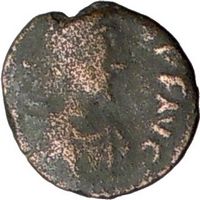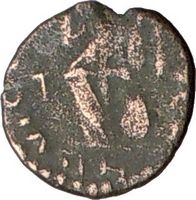Avitus - Roman Emperor 455-456AD Rare Ancient Coins for Sale and
Biography
Buy
Avitus - Roman Emperor 455-456AD Rare Ancient Coins. Explore the entire
selection of
Avitus coins available for sale, along with thousands of other ancient
Greek, Roman and Byzantine Medieval coins from a Top-Rated seller on
eBay. Enjoy incredible value as every coin purchased here comes with
it's own, signed, custom-made certificate of authenticity, featuring
professional description, research and brief historical synopsis, a
$50-$100 absolutely free.
 
Example of Authentic Ancient
Coin of:
Avitus - July 455- October 456 A.D.
Bronze AE4 Struck circa 455-456 A.D.
Reference: RIC 2413
DNAVITVSPFAVG - Diademed, draped and cuirassed bust right.
VICTORIAAVGG Exe: Letter/RM - Victory advancing left, holding wreath and
palm.
Eparchius Avitus (c. 385 - after 17 October 456 or in 457) was
Western Roman Emperor from July 8 or
July 9, 455 to October 17, 456. A Gallic-Roman aristocrat, he was a
senator and a high-ranking officer both in the civil and military
administration, as well as
Bishop of Piacenza.
A representative of the Gallic-Roman aristocracy, he opposed the
reduction of the Western Roman Empire to Italy alone, both politically
and from the administrative point of view. For this reason, as Emperor
he introduced several Gallic senators in the imperial administration;
this policy, however, was opposed by both the senatorial aristocracy and
by the people of Rome, which had suffered because of the
Vandalic sack of the city in 455.
Avitus had a good relationship with the
Visigoths, in particular with their
king
Theodoric II, who was a friend of his
and who acclaimed Avitus Emperor, but the possibility of a strong and
useful alliance between Visigoths and Romans ended when Theodoric
invaded Roman
Hispania and then refused to help
Avitus against the rebel Roman generals who deposed him.
Origins and
early career
Avitus was born in
Clermont, in a noble family of the
senatorial aristocracy of Gallic-Roman origin; his father was possibly
Flavius Julius Agricola, consul in 421.
He had at least two sons and a daughter:
Agricola (440 – after 507, a
vir inlustris),
Ecdicius Avitus (later
patricius and
magister militum under Emperor
Julius Nepos), and, clarissima
femina (who married the
praetorian prefect of Gaul
Tonantius Ferreolus). He was also
related to
Magnus Felix and
Priscus Valerianus. Agricola's
daughter, also named Papianilla (490–530), married her relative
Parthenius (485–548), a
Patron in 542 and perhaps a
great-grandson of
Felix Ennodius.
Avitus followed a course of study typical for a young man of his
rank: he studied law. Before 421 he was sent to the powerful
patricius
Flavius Constantius (shortly Emperor in
421), to ask for a tax reduction for his own country. This embassy was
successful. A relative of his, Theodorus, was hostage at the court of
the King of
Visigoths,
Theodoric I: in 425/426 Avitus went and
met him, thus meeting the King, who let Avitus enter his own court.
Here, around 439, Avitus met the son of Theodoric,
Theodoric II, who later became King.
Avitus inspired the young Theodoric to study Latin poets.
He then started a military career: he served under the
magister militum
Aetius in his campaign against the
Juthungi and the
Norics (430–431) and also against the
Burgundians (436). In 437, after being
elevated to the rank of
vir inlustris, he returned to
Alvernia, where he held a high office,
probably
magister militum per Gallias; in
that same year he defeated near Clermont a group of Hunnic raiders and
obliged Theodoric to lift the siege of
Narbonne. In 439 he became
Praetorian prefect of Gaul; in that
same year he renewed the friendship treaty with the Visigoths.
Before the summer of 440, he retired to private life in his lands,
called Avitacum, near Clermont. Here he lived until 451, when the
Huns, led by
Attila, invaded the Western Roman
Empire; Avitus used his own influence over Theodoric to convince him to
an alliance between Visigoths and Romans. Theodoric and Aetius defeated
Attila in the
Battle of Châlons, although Theodoric
was killed there.
Rise to the
throne
In the late spring of 455, Avitus was recalled to service by emperor
Petronius Maximus and was elevated to
the rank of
magister militum, probably
praesentalis; Maximus sent Avitus in an embassy to the court of
Theodoric II, who had succeeded to his
father, at
Toulouse: this embassy probably
confirmed the new King and his people the condition of
foederati of the Empire and asked
for their support to the new Emperor.
While Avitus was at Theodoric's court, news came of the death of
Petronius Maximus (May 22) and of the
sack of Rome by the
Vandals of
Gaiseric. Theodoric acclaimed Avitus
Emperor in Toulouse, on July 9,
the new Emperor was acclaimed by the Gallic chiefs gathered in
Viernum, near
Arelate, and later, around August 5,
before Avitus reached Rome, he received the recognition of the
Roman Senate.
Avitus stayed in Gaul for three months, to consolidate his power in
the region that was the center of his support, and later went to Italy
with a Gallic army, probably reinforced with a Gothic force. He probably
travelled to
Noricum to restore the imperial
authority in that province, and then passed through
Ravenna, where he left a Gothic force
under the new
patricius and
magister militum
Remistus, a Visigoth. On September 21,
finally, he entered Rome.
Consolidation
of power
The effective power of Avitus depended on the support of all the
major players in the Western Roman Empire in the mid-5th century. The
new Emperor needed the support of both the civil institutions, the
Roman senate and the Eastern Roman
Emperor
Marcian, as well as that of the army
and its commanders (the generals
Majorian and
Ricimer) and the
Vandals of
Gaiseric.
On January 1, 456, Avitus took the consulate,
as traditionally the Emperors always held the consulate in the first
year upon assuming the purple. However, his consulate sine collega
(without a second Consul) was not recognised by the Eastern court, which
nominated two consuls,
Iohannes and
Varanes: the fact that the two courts
did not agree on a couple of consuls but each nominated its own means
that, despite Avitus' actions to receive the recognition of the Eastern
Emperor (Hydatius writes – Chronicle, 166, that Avitus sent some
ambassadors to Marcian to discuss the separation of their spheres of
influences, and later adds that the two Emperors ruled in agreement –
Chronicle, 169), the relationship between the two halves was non
optimal.
Foreign policy
The problem posed by the Vandal incursions was so big that Marcian
had already tried to obtain the interruption of the raids in the Italian
coasts, with no success. Avitus reiterated this initiative, recalling
the treaty subscribed by
Gaiseric and
Valentinian III in 442 and entrusting
the defence of the Empire to the Roman army and its allies.
The Vandal raids restarted after the winter truce in March 456, despite
a further embassy by
Marcian, with the destruction of
Capua. Avitus sent
Ricimer to defend
Sicily, and the Romans defeated the
Vandals twice, once in a land battle near
Agrigento and another in a naval battle
off
Corsica.
During Avitus' reign, the
Visigoths expanded into
Hispania, nominally under Roman
authorisation but actually for their own interests. In 455 Avitus had
sent an ambassador, comes Fronto, to the
Suebi and then to
Theodoric II to ask them formally to
recognise Roman rule. When the Suebi invaded the Roman province of
Hispania Tarraconensis the Visigoths
attacked and defeated them in the
Battle of the Urbicus River (October 5,
456), occupying the province as
foederati of the Empire, at least
nominally.
Fall
In the meantime, the resentment of the Italic population against
Avitus grew. The Gallic-Roman Emperor, in fact, had given to members of
the Gallic-Roman aristocracy many key offices of the public
administration. Furthermore the population of Rome, devastated by the
Vandal sack, suffered a scarcity of
food due to the Vandal naval supremacy that controlled the naval routes,
a scarcity aggravated by the foreign troops which had arrived with
Avitus. The imperial treasury was almost empty and, after disbanding his
Visigoth guard because of popular pressure, Avitus was obliged to pay
their huge wages by melting down and selling the bronze of some statues.
All these events caused the Emperor to grow unpopular.
Counting on the popular discontent, on the disbandment of the
imperial guard, and on the prestige gained through their victories,
Ricimer and the
comes domesticorum
Majorian rebelled against Avitus; the
Emperor was obliged to leave Rome in early autumn and to move north.
Ricimer had the Roman Senate depose Avitus and ordered the murder of the
magister militum
Remistus at
Ravenna, in the in Classis
Palace, on September 17 456.
Avitus decided to react. First he chose Messianus, one of his
collaborators in his embassy to the Visigoths ordered by
Petronius Maximus, as the new
magister militum; then he probably went to Gaul (Hydatius says to
Arelate)
to collect all the available forces, probably the Visigoth guard he had
just disbanded; finally he led his forces against the troops of Ricimer,
near
Piacenza. The Emperor and his army
entered the city and attacked the huge army led by Ricimer, but after a
great massacre of his men, including Messianus, Avitus fled (October 17
or 18).
Ricimer and Majorian decided to spare the life of the defeated
Emperor; they deposed Avitus and obliged him to become Bishop of
Piacenza.
Death
The events that led to Avitus' death, in 457, are still obscure. One
major reason of danger for Avitus was the fact that in some areas of the
Western Empire he was still considered the lawful Emperor: for example,
the contemporary historian
Hydatius, who lived in Spain,
considered the year 457 the third of Avitus' reign;
furthermore
Sidonius Apollinaris tells about a
failed coup d'etat in Gaul, organised by one Marcellus
and probably aimed at bringing Avitus back on the throne.
Avitus was informed that the
Roman Senate had condemned him to
death, and tried to flee to Gaul, officially travelling there to bring
donations to the basilica of Saint Julian in
Alvernia, his homeland. According to
Gregory of Tours, Avitus died during
the journey; according to other sources, he was killed by Majorian and
Ricimer, who had him strangled or starved to death.
He was buried at
Brioude, next to Saint Julian's tomb.
|